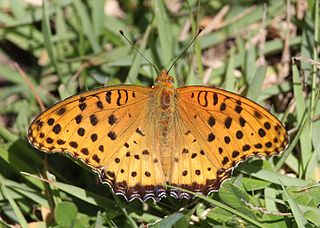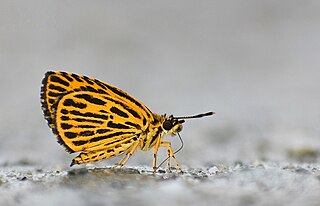
Cepora nadina, the lesser gull, is a small to medium-sized butterfly of the family Pieridae, that is, the yellows and whites. The species was first described by Hippolyte Lucas in 1852. It is native to Sri Lanka, India, Myanmar, Hainan, and southeast Asia.

Libythea lepita, the common beak, is a butterfly that belongs to the Libytheinae group of the brush-footed butterflies family. It is found from southern India to Japan and its larval food plants include members of the Cannabaceae, particularly in the genera Celtis and Trema.

Miletus symethus, the great brownie, is a small butterfly found in India that belongs to the lycaenids or blues family. The species was first described by Pieter Cramer in 1777.

Junonia hierta, the yellow pansy, is a species of nymphalid butterfly found in the Palaeotropics. It is usually seen in open scrub and grassland habitats.

The Indian fritillary is a species of butterfly of the nymphalid or brush-footed family. It is usually found from south and southeast Asia to Australia.

Grammodes stolida, the geometrician, is a moth of the family Erebidae. The species was first described by Johan Christian Fabricius in 1775. It is found in Africa, southern Europe, most of Asia and Australia. It migrates to central and northern Europe as far north as England, Denmark and Finland.

Episcepsis sixola is a moth of the family Erebidae. It was described by William Schaus in 1910. It is found in Costa Rica.
Givira tristani is a moth in the family Cossidae. It is found in Colombia, Guatemala, Honduras and Mexico.
Callidrepana amaura is a moth in the family Drepanidae first described by Warren in 1901. It is found in Nigeria.
Depressaria artemisiella is a moth in the family Depressariidae. It was described by James Halliday McDunnough in 1927. It is found in North America, where it has been recorded from British Columbia and Utah.
Striginiana nobilis is a moth in the family Eupterotidae. It was described by William Jacob Holland in 1893. It is found in Gabon.
Dichomeris mistipalpis is a moth in the family Gelechiidae. It was described by Walsingham in 1911. It is found in Panama, Brazil and Guyana.
Dichomeris eurynotus is a moth in the family Gelechiidae. It was described by Walsingham in 1897. It is found in the Central African Republic and Sierra Leone.
Dichomeris straminis is a moth in the family Gelechiidae. It was described by Thomas de Grey in 1881. It is found in Mozambique, South Africa and Zimbabwe.
Helcystogramma melantherella is a moth in the family Gelechiidae. It was described by August Busck in 1900. It is found in North America, where it has been recorded from North Carolina south to Florida and west to Texas and Arkansas.
Gonionota dissita is a moth in the family Depressariidae. It was described by Clarke in 1964. It is found in Trinidad.
Megalopyge tharops is a moth of the family Megalopygidae. It was described by Caspar Stoll in 1782. It is found in French Guiana and Brazil.
Podalia lanocrispa is a moth of the family Megalopygidae. It was described by E. Dukinfield Jones in 1912. It is found in Brazil.

Podalia orsilochus is a moth of the Megalopygidae family. It was described by Pieter Cramer in 1775. It is found in Mexico, Costa Rica, Brazil, Guyana and Venezuela.

Ochus subvittatus, the tiger hopper, is the only species in the monotypic moth genus Ochus of the family Hesperiidae. The genus was erected by Lionel de Nicéville in 1894. The species was first described by Frederic Moore in 1878. It is found in the Khasi Hills and Naga Hills of India, Myanmar, Thailand, Laos, Vietnam and Yunnan.








